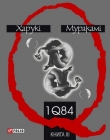
Текст книги "1q84"
Автор книги: Haruki Murakami
Жанр:
Современная проза
сообщить о нарушении
Текущая страница: 27 (всего у книги 81 страниц)
“You may be right,” Tengo said, after giving it some thought.
“Is that what happens in the world you’re writing about? Do people go crazy all the time?”
“No, not really. They do pretty much the same things we do in this world.”
She squeezed Tengo’s penis softly. “So in the world that isn’t here, people do pretty much the same things as those of us who are in this world. If that’s the case, then, what’s the point of its being a world that isn’t here?”
“The point of its being a world that isn’t here is in being able to rewrite the past of the world that is here,” Tengo said.
“So you can rewrite the past any way you like, as much as you like?”
“That’s right.”
“Do you want to rewrite the past?”
“Don’t you want to rewrite the past?”
She shook her head. “No, I don’t have the slightest desire to rewrite the past or history or whatever. What I’d like to rewrite is the present, here and now.”
“But if you rewrote the past, obviously, the present would change, too. What we call the present is given shape by an accumulation of the past.”
She released another deep sigh. Then, as if testing the operation of an elevator, she raised and lowered the hand on which Tengo’s penis lay. “I can only say one thing. You used to be a math prodigy and a judo belt holder and you’re even writing a long novel. In spite of all that, you don’t understand anything at all about this world. Not one thing.”
Tengo felt no particular shock at this sweeping judgment. These days, not understanding anything had more or less become the normal state of affairs for him. This was not a new discovery.
“It doesn’t matter, though, even if you don’t understand anything,” his older girlfriend said, turning to press her breasts against him. “You’re a dreaming math teacher who keeps writing his long novel day after day, and I want you to stay just like that. I love your wonderful penis—the shape, the size, the feel. I love it when it’s hard and when it’s soft, when you’re sick and when you’re well. And for the time being, at least, it belongs only to me. It does, doesn’t it?”
“That is correct,” Tengo assured her.
“I have told you that I’m a terribly jealous person, haven’t I?”
“You certainly have—jealous beyond reason.”
“All reason. I’ve been very consistent that way for many years now.” She slowly began moving her fingers in three dimensions. “I’ll get you hard again right away. You wouldn’t have any objection to that, would you?”
Tengo said that he would have no objection.
“What are you thinking about now?”
“You as a student, listening to a lecture at Japan Women’s University.”
“The text was Martin Chuzzlewit. I was eighteen and wearing a cute pleated dress. My hair was in a ponytail. I was a very serious student, and still a virgin. I feel like I’m talking about something from an earlier life. Anyhow, the difference between ‘lunatic’ and ‘insane’ was the first bit of knowledge I ever learned at the university. What do you think? Does it get you excited to imagine that?”
“Of course it does,” he said, closing his eyes, imagining her pleated dress and her ponytail. A very serious student, a virgin. But jealous beyond all reason. The moon illuminating Dickens’s London. The insane people and the lunatics wandering around London. They wore similar hats and similar beards. How was it possible to distinguish one from the other? With his eyes closed, Tengo could not be sure which world he now belonged to.

BOOK 2 JULY-SEPTEMBER

CHAPTER 1
Aomame
IT WAS THE MOST BORING TOWN IN THE WORLD
Although the rainy season had not been declared officially over, the Tokyo sky was intensely blue and the midsummer sun beat down on the earth. With their newly thickened burden of green leaves, the willows once again cast dense, trembling shadows on the street.
Tamaru met Aomame at the front door, wearing a dark summer suit, white shirt, and solid-color tie. There was not a drop of sweat on him. Aomame always found it mysterious that such a big man did not sweat on even the hottest summer days.
He gave her a slight nod, and, after uttering a short greeting that she found barely audible, he said nothing further. Today there was none of their usual banter. He walked ahead of her down a long corridor and did not look back, instead guiding her to where the dowager waited. Aomame guessed that he was in no mood for small talk. Maybe the death of the dog was still bothering him. “We need a new guard dog,” he had said on the phone, as if commenting on the weather, though Aomame knew this was no indication of how he actually felt. The female German shepherd had been important to him: they had been close for many years. He had taken her sudden, baffling death as both a personal insult and a challenge. As she looked at silent Tamaru’s back, as broad as a classroom blackboard, Aomame could imagine the quiet anger he was feeling.
Tamaru opened the living-room door to let Aomame in, and stood in the doorway awaiting instructions from the dowager.
“We won’t be needing anything to drink now,” she said.
Tamaru gave her a silent nod and quietly closed the door, leaving the two women alone. A round goldfish bowl, with two goldfish inside, had been placed on the table beside the armchair in which the dowager was sitting—an utterly ordinary goldfish bowl with utterly ordinary goldfish and the requisite green strip of seaweed. Aomame had been in this large, handsome living room any number of times, but had never seen the goldfish before. She felt an occasional puff of cool air against her skin and guessed that the air conditioner must be running on low. On a table behind the dowager stood a vase containing three white lilies. The flowers were large and fleshy white, like little animals from an alien land that were deep in meditation.
The dowager waved Aomame over to the sofa beside her. White lace curtains covered the windows facing the garden, but still the summer afternoon sun was strong. In its light the dowager looked tired, which was unusual for her. Slumped in the big chair, she rested her chin on her hand, eyes sunken, neck more wrinkled than before, lips drained of color. The outer tips of her long eyebrows had dropped a notch, as if they had given up the struggle against gravity. Perhaps the efficiency of her circulatory system had declined: her skin appeared to have white, powdery blotches. She had aged at least five or six years since their last meeting. And today, for a change, it didn’t seem to bother her to show such obvious fatigue. This was not normal for her. As far as Aomame had observed, the dowager always tried—with much success—to keep her appearance smart, her inner strength fully mobilized, her posture perfectly erect, her expression focused, and all signs of aging hidden.
Aomame noticed that many things in the house were different today. Even the light had taken on a different color. And the bowl of goldfish, such a common object, did not fit in with the elegant high-ceilinged room full of antique furniture.
The dowager remained silent for a time, chin in hand, staring into the space adjacent to Aomame, where, Aomame knew, there was nothing special to be seen. The dowager simply needed a spot where she could temporarily park her vision.
“Do you need something to drink?” the dowager asked softly.
“No, thanks, I’m not thirsty,” Aomame answered.
“There’s iced tea over there. Pour yourself a glass if you like.”
The dowager pointed toward a side table set next to the door. On it was a pitcher of tea containing ice and lemon slices, and, next to that, three cut-glass tumblers of different colors.
“Thank you,” Aomame said, remaining seated and waiting for the dowager’s next words.
For a time, however, the dowager maintained her silence. She had something she needed to talk to Aomame about, but if she actually put it into words, the facts contained in the “something” might irretrievably become more definite as facts, so she wanted to postpone that moment, if only briefly. Such was the apparent significance of her silence. She glanced at the goldfish bowl next to her chair. Then, as if resigning herself to the inevitable, she finally focused her gaze directly on Aomame. Her lips were clenched in a straight line, the ends of which she had deliberately turned up.
“You heard from Tamaru that the safe house guard dog died, didn’t you—in that inexplicable way?”
“Yes, I did.”
“After that, Tsubasa disappeared.”
Aomame frowned slightly. “Disappeared?”
“She just vanished. Probably during the night. This morning she was gone.”
Aomame pursed her lips, searching for something she could say, but the words did not come to her immediately. “But … from what you told me last time … I thought Tsubasa always had somebody nearby when she slept … in the same room … as a precaution.”
“Yes, that is true, but the woman fell into an unusually deep sleep and was totally unaware that Tsubasa had left. When the sun came up, there was no sign of Tsubasa in the bed.”
“So the German shepherd died, and the next day Tsubasa disappeared,” Aomame said, as if to verify the accuracy of her understanding.
The dowager nodded. “So far, we don’t know for sure if the two events are related, but I think that they are.”
Aomame glanced at the goldfish bowl on the table for no particular reason. The dowager followed Aomame’s glance. The two goldfish swam coolly back and forth in their glass pond, barely moving their fins. The summer sunlight refracted strangely in the bowl, creating the illusion that one was peering into a mysterious ocean cave.
“I bought these goldfish for Tsubasa,” the dowager said by way of explanation, looking at Aomame. “There was a little festival at one of the Azabu shopping streets, so I took her for a walk there. I thought it wasn’t healthy for her to be locked up in her room all the time. Tamaru came with us, of course. I bought her the fish at one of the stands. She seemed fascinated by them. She put them in her room and spent the rest of the day staring at them. When we realized she was gone, I brought them here. Now I’m spending a lot of time watching the fish. Just staring at them, doing nothing. Strangely enough, you really don’t get tired of watching them. I’ve never done this before—stared at goldfish so intently.”
“Do you have any idea where Tsubasa might have gone?” Aomame asked.
“None whatsoever,” the dowager answered. “She doesn’t have any relatives. As far as I know, the child has nowhere to go in this world.”
“What is the chance that someone took her away by force?”
The dowager gave a nervous little shake of the head, as if she were chasing away an invisible fly. “No, she just left. No one came and forced her to go. If that had happened, it would have awakened someone around her. Those women are all light sleepers. No, I’m sure she made up her mind and left on her own. She tiptoed downstairs, quietly unlocked the front door, and went out. I can see it happening. She didn’t make the dog bark—it had died the night before. She didn’t even change her clothes. The next day’s clothing was all nicely folded nearby, but she went out in her pajamas. I don’t think she has any money, either.”
Aomame’s grimace deepened. “All by herself—in pajamas?”
The dowager nodded. “Yes, where could a ten-year-old girl—all alone, in pajamas, with no money—possibly go in the middle of the night? It’s inconceivable, using ordinary common sense. But for some reason, I don’t find it all that strange. Far from it. I even get the feeling that it was something that had to happen. We’re not even looking for her. I’m not doing anything, just watching the goldfish like this.”
She glanced toward the goldfish bowl as she spoke. Then she turned back toward Aomame.
“I know that it would be pointless to search for her. She has gone somewhere out of our reach.”
The dowager stopped resting her chin on her hand and, with her hands on her knees, she slowly released a breath that she had held inside for a very long time.
“But why would she have done such a thing?” Aomame asked. “Why would she have left the safe house? She was protected as long as she stayed, and she had nowhere else to go.”
“I don’t know why. But I feel that the dog’s death was the trigger. She loved the dog, and the dog loved her. They were like best friends. The fact that the dog died—and died in such a bloody, incomprehensible way—was a great shock to her. Of course. It was a shock to everyone in the house. Now that I think of it, however, the killing of the dog might have been a kind of message to Tsubasa.”
“A message?”
“That she should not stay here. That they knew she was hiding here. That she had to leave. That even worse things might happen to the people around her if she didn’t go.”
The dowager’s fingers ticked off an imaginary interval on her lap. Aomame waited for the rest of what the dowager had to say.
“She probably understood the message and left on her own. I’m sure she didn’t leave because she wanted to. She had to go, even knowing that she had no place to go. I can hardly stand the thought—that a ten-year-old girl was forced to make such a decision.”
Aomame wanted to reach out and hold the dowager’s hand, but she stopped herself. There was still more to tell.
The dowager continued, “It was a great shock to me, of course. I feel as if a part of me has been physically torn out. I was planning to formally adopt her, as you know. I knew that things would not work out so easily, but even recognizing all the difficulties involved, it was something I wanted to do. I was in no position to complain to anyone if it did not work out, but, to tell you the truth, at my age, these things take an enormous toll.”
Aomame said, “But Tsubasa might suddenly come back one day soon. She has no money, and there’s no place she can go …”
“I’d like to think you’re right, but that is not going to happen,” the dowager said, her voice completely flat. “She’s only ten years old, but she has ideas of her own. She made up her mind and left. I doubt she would ever decide to come back.”
“Excuse me a moment,” Aomame said, walking over to the table by the door, where she poured herself some iced tea into a green cut-glass tumbler. She was not particularly thirsty, but she wanted to introduce a pause into the conversation by leaving her seat. She then returned to the sofa, took a sip of tea, and set the tumbler down on the glass tabletop.
The dowager waited for Aomame to settle onto the sofa again and said, “That’s enough about Tsubasa for now,” stretching her neck and clasping her hands together to give herself an emotional pause. “Let’s talk about Sakigake and its Leader. I’ll tell you what we have been able to find out. This is the main reason I called you here today. Of course, it also has to do with Tsubasa.”
Aomame nodded. She had been expecting this.
“As I told you last time, we absolutely must ‘take care of’ this Leader. We must transport him into another world. You know, of course, that he is in the habit of raping preteen girls, none of whom have had their first period. He makes up ‘doctrine’ and exploits the religion’s system to justify such actions. I have had this researched in as much detail as possible and paid quite a bit of money for the information. It wasn’t easy. The cost far exceeded my expectations, but we succeeded in identifying four girls he is likely to have raped. Tsubasa was the fourth.”
Aomame lifted her glass and took a sip of iced tea, tasting nothing, as if her mouth were stuffed with cotton that absorbed all flavor.
“We still don’t know all the details, but at least two of the girls are still living in the religion’s compound,” the dowager said. “We’re told they serve Leader as his own personal shrine maidens. They never appear before the ordinary believers. We don’t know if they stay there of their own free will or are simply unable to run away. We also don’t know if there is still a sexual relationship between them and Leader. In any case, they all live in the same place, like a family. The area of Leader’s residence is strictly off-limits to ordinary believers. Many things are still shrouded in mystery”
The cut-glass tumbler was beginning to sweat on the tabletop. The dowager paused to catch her breath and then continued.
“We do know one thing for certain. The first of the four victims is Leader’s own daughter.”
Aomame frowned. Her facial muscles began to move involuntarily, becoming greatly distorted. She wanted to say something, but her voice would not form the words.
“It’s true,” the dowager said. “They think that the first girl he violated was his own daughter. It happened seven years ago, when she was ten.”
The dowager lifted the intercom and told Tamaru to bring them a bottle of sherry and two glasses. They fell silent while they waited for him, each woman putting her thoughts in order. Tamaru came in, carrying a tray with a new bottle of sherry and two slim, elegant crystal glasses. After lining up everything on the table, he twisted open the bottle with a sharp, precise movement, as if wringing a chicken’s neck. The sherry gurgled as he poured it. The dowager nodded, and Tamaru bowed and left the room, saying nothing, as usual. Not even his steps made a sound.
The dog is not the only thing that’s bothering him, Aomame thought. The girl’s disappearance is another deep wound for him. She was so important to the dowager, and yet she vanished before his very eyes! Strictly speaking, the girl was not his responsibility. He was not a live-in bodyguard; he slept in his own home at night, a ten-minute walk away, unless some special task kept him at the dowager’s. Both the dog’s death and the girl’s disappearance had happened at night, when he was absent. He could have prevented neither. His job was to protect the dowager and her Willow House. His duties did not extend to security for the safe house, which lay outside the compound. Even so, the events were a personal defeat for Tamaru, an unforgivable slight.
“Are you prepared to take care of that man?” the dowager asked Aomame.
“Fully prepared,” Aomame assured her.
“It’s not going to be easy,” the dowager said. “Of course, none of the work I ask you to do is easy. But this is especially difficult. We’ll do everything we can to set it up, but I’m not sure of the extent to which we can guarantee your safety. It will probably involve a greater risk than usual.”
“I understand.”
“As I have told you before, I would rather not send you into dangerous situations, but to be honest, our choices are limited this time.”
“I don’t mind,” Aomame said. “We can’t leave that man alive in this world.”
The dowager lifted her glass and let some of her sherry glide over her tongue. Then she watched the goldfish again for a while.
“I’ve always enjoyed sherry at room temperature on a summer afternoon. I’m not fond of cold drinks on hot days. I’ll take a drink of sherry and, a little later, lie down for a nap, and fall asleep before I know it. When I wake up, some of the day’s heat is gone. I hope I can die that way—drink a little sherry on a summer afternoon, stretch out on a sofa, drop off to sleep, and never wake up.”
Aomame also lifted her sherry glass and took a small sip. She was not fond of sherry, but she definitely needed a drink. This time the taste got through to her, unlike the iced tea. The alcohol stabbed at her tongue.
“I want you to tell me the truth,” the dowager said. “Are you afraid to die?”
Aomame needed no time at all to answer. Shaking her head, she said, “Not particularly—living as myself scares me more.”
The dowager gave a fleeting smile that seemed to revive her a little. Her lips now had a touch of color. Maybe speaking with Aomame had helped, or perhaps the sip of sherry was having its effect.
“I believe you said there is a particular man you are in love with.”
“Yes, it’s true, but the chances of my actually being with him are infinitely close to zero. So even if I were to die, the resulting loss would also be infinitely close to zero.”
The dowager narrowed her eyes. “Is there a concrete reason that you think you probably will never be united with him?”
“Not in particular,” Aomame said. “Other than the fact that I am me.”
“Don’t you have any intention of taking the initiative to approach him?”
Aomame shook her head. “The most important thing to me is the fact that I want him with my whole heart.”
The dowager kept her eyes fixed on Aomame for a while in apparent admiration. “You are very clear about your own ideas, aren’t you?” she said.
“I had to be that way,” Aomame said, going through the motions of bringing the sherry glass to her lips. “It was not a matter of choice.”
Silence filled the room for a short while. The lilies continued hanging their heads, and the goldfish continued swimming in the refracted summer sunlight.
“We can set things up so that you are alone with Leader,” the dowager said. “It won’t be easy, and it will take a good deal of time, but I can make it happen. All you have to do is what you always do for us. Except this time, you’ll have to disappear afterward. Have plastic surgery. Quit your current job, of course, and go far away. Change your name. Get rid of all your possessions. Become another person. Of course you will be compensated with a suitable payment. I will be responsible for everything else. Is this all right with you?”
Aomame said, “As I said before, I don’t have anything to lose. My work, my name, this life of mine in Tokyo: none of them mean anything to me. I have no objections at all.”
“And your face? You don’t mind if it changes?”
“Would it change for the better?”
“If you wanted, of course we could do that,” the dowager replied with a somber expression. “We can make a face according to your wishes—within limits, of course.”
“As long as we’re at it, I might as well have them do a breast enlargement.”
The dowager nodded. “That may be a good idea—for disguise purposes, I mean, of course.”
“I’m just kidding,” Aomame said, softening her expression. “I’m not exactly proud of them, but I don’t mind leaving them just the way they are. They’re light and easy to carry. And it would be such a pain to buy all new bras.”
“That’s nothing. I’d buy you as many as you liked.”
“No, I’m kidding about that, too,” Aomame said.
The dowager cracked a smile. “Sorry, I’m not used to hearing jokes from you.”
“I don’t have any objection to plastic surgery,” Aomame said. “I’ve never felt I wanted to have it, but I don’t have any reason to refuse it, either. I’ve never really liked my face, and I don’t have anybody who likes it especially, either.”
“You’ll lose all your friends, too, you know.”
“I don’t have any ‘friends,’ ” Aomame said, but then Ayumi came to mind. If I were to just disappear without saying anything to her, she might be sad. She might even feel betrayed. But there had been a problem with calling her a “friend” right from the start. Aomame was traveling too dangerous a road to make friends with a police officer.
“I had two children,” the dowager said. “A boy and a girl. She was three years younger than he. As I told you before, she died—she committed suicide. She had no children. My son and I have had our troubles and have not gotten along well for a very long time. I hardly ever talk to him now. I have three grandchildren, but I haven’t seen them for a long time, either. When I die, though, most of my estate will go to my only son and his children, almost automatically. Wills don’t carry much force these days, unlike the way it used to be. For now, though, my discretionary funds are quite considerable. I’d like to leave a lot of that money to you, if you succeed in this new task. Please don’t misunderstand, though: I’m not trying to buy you off. All I want to say is that I think of you as my own daughter. I wish you were my actual daughter.”
Aomame gazed quietly at the dowager, who set her sherry glass on the table as if suddenly recalling that she was holding it. She then turned to look at the glossy petals of the lilies behind her. Inhaling their rich fragrance, she looked once again at Aomame.
“As I said before, I was planning to adopt Tsubasa, but now I’ve lost her, too. I couldn’t help her. I did nothing but stand by and watch her disappear alone into the dark of night. And now, I’m getting ready to send you into far greater danger than ever before. I don’t really want to do that, but unfortunately, I can’t think of any other way to accomplish our goal. All I can do is offer you tangible compensation.”
Aomame listened attentively without comment. When the dowager fell silent, the chirping of a bird came clearly through the windowpane. It continued for a while, until the bird flew off somewhere.
“That man must be ‘taken care of,’ no matter what,” Aomame said. “That is the most important thing now. I have nothing but the deepest gratitude for the way you feel about me. I think you know that I rejected my parents and they abandoned me when I was a child; we both had our reasons. I had no choice but to take a path without anything like family affection. In order to survive on my own, I had to adapt myself to such a frame of mind. It wasn’t easy. I often felt that I was nothing but scum—some kind of meaningless, filthy residue—which is why I am so grateful to you for what you just said to me. But it’s a bit too late for me to change my attitude or lifestyle. This is not true of Tsubasa, however. I’m sure she can still be saved. Please don’t resign yourself to losing her so easily. Don’t lose hope. Get her back!”
The dowager nodded. “I’m afraid I didn’t put it very well. I am of course not resigned to losing her. I will do everything in my power to bring her back. But as you can see, I’m too tired right now. My failure to help her has filled me with a deep sense of powerlessness. I need a little time to get my energy back. On the other hand, I may just be too old. The energy might never come back, no matter how long I wait.”
Aomame got up from the sofa and went over to the dowager. Sitting on the arm of her armchair, she grasped the woman’s slim, elegant hand.
“You’re an incredibly tough woman,” Aomame said. “You can go on living with more strength than anybody. You just happen to be exhausted. You ought to lie down and get some rest. When you wake up, you’ll be your old self, I’m sure.”
“Thank you,” the dowager said, squeezing Aomame’s hand in return. “You’re right: I should probably get some sleep.”
“I’ll be leaving, then,” Aomame said. “I will be waiting to hear from you. I’ll put my things in order—not that I own so many ‘things’ to put in order.”
“Prepare yourself to travel light. If there’s anything you need, we’ll take care of it.”
Aomame released the dowager’s hand and stood up. “Good night. I’m sure everything is going to go well.”
The dowager nodded. Still cradled in her chair, she closed her eyes. Aomame took one last glance at the goldfish bowl and one last whiff of the lilies before she left the high-ceilinged living room.
. . .
Tamaru was waiting for her at the front door. Five o’clock had come, but the sun was still high in the sky, its intensity undiminished. The glare of its light reflected off Tamaru’s black cordovan shoes, which were perfectly polished as usual. A few white summer clouds appeared in the sky, but they gathered at its corners, where they could not block the sun. The end of the rainy season was not yet near, but there had been several days in a row of midsummer-like weather, complete with the cries of cicadas, which now sounded from the garden’s trees. The cries were not very strong. If anything, they seemed somewhat restrained. But they were a positive sign of the season to come. The world was still working as it always did. The cicadas cried, the clouds moved along, Tamaru’s shoes were spotless. But all of this seemed fresh and new to Aomame: that the world should continue along as usual.
Aomame asked Tamaru, “Can we talk a little? Do you have time?”
“Fine,” Tamaru said. His expression did not change. “I have time. Killing time is part of what I do for a living.” He lowered himself into one of the garden chairs by the front door. Aomame sat in the chair next to his. The overhanging eaves blocked the sunlight. The two of them sat in their cool shadow. There was the smell of fresh grass.
“Summer’s here already,” Tamaru said.
“The cicadas have started crying,” Aomame replied.
“They seem a little early this year. This area’s going to get very noisy again for a while. That piercing cry hurts your ears. I heard exactly the same sound when I stayed in the town of Niagara Falls. It just kept going from morning to night without a letup, like a million cicadas.”
“So you’ve been to Niagara Falls.”
Tamaru nodded. “It was the most boring town in the world. I stayed there alone for three days and there was nothing to do but listen to the sound of the falls. It was too noisy to read.”
“What were you doing alone in Niagara Falls for three days?”
Instead of answering, Tamaru just shook his head.
Tamaru and Aomame went on listening to the faint cries of the cicadas, saying nothing.
“I’ve got a favor to ask of you,” Aomame said.
This seemed to pique Tamaru’s interest. Aomame was not in the habit of asking people for favors.
She said, “It’s kind of unusual. I hope it doesn’t annoy you.”
“I don’t know if I’ll be able to accommodate you, but I’ll be glad at least to listen. It’s not polite to be annoyed when a lady asks a favor.”
“I need a gun,” Aomame said flatly. “One that would fit in a handbag. Something with a small recoil but still fairly powerful and dependable. Not a modified fake or one of those Filipino copies. I’ll only need to use it once. And one bullet should be enough.”
Silence. Tamaru kept his eyes on Aomame the whole time, unwavering.
Then, speaking slowly and carefully, Tamaru said, “You do know that it is illegal in this country for an ordinary citizen to own a handgun, don’t you?”
“Of course I do.”
“And just so you know, let me say this,” Tamaru continued. “I have never once been charged with a crime. That is to say, I have no police record. Now, this may be owing to some oversights on the part of the justice system, I don’t deny that. But at least as far as the written record is concerned, I’m a good citizen. Honest, upright, pure. I’m gay, but that’s not against the law. I pay my taxes as ordered, and I vote in elections—though no candidate I voted for was ever elected. I’ve even paid all my parking tickets before the due date. I haven’t been stopped for speeding in the past ten years. I’m enrolled in the National Health Insurance system. I pay my NHK licensing fee automatically from my bank account, and I carry both an American Express card and a MasterCard. Although I have no intention of doing so now, I could qualify for a thirty-year mortgage if I wanted one, and it always pleases me immensely to think that I am in such a position. In other words, I could be called a pillar of society without the least bit of irony. Do you realize that you are asking such a person to provide you with a gun?”





